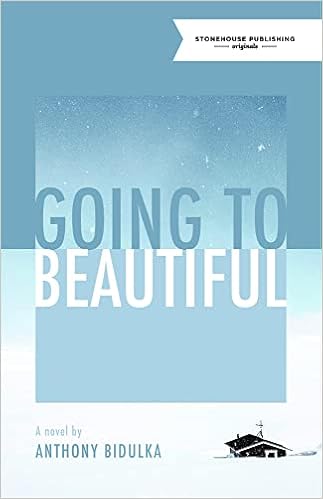4 Stars
This is my first time reading an Anthony Bidulka book, though a couple of friends have raved about his Russell Quant series. Having been impressed with Going to Beautiful, I think I’ll be checking out his other offerings.
Jake Hardy, a celebrity chef, is left reeling after the sudden death of his husband of thirty years, Eddie Kravets. After a difficult year, Jake finds himself travelling to Beautiful, Saskatchewan, where it seems that Eddie was born. Accompanied by his friend and neighbour Baz, “a transgender bon vivant socialite,” Jake sets out to find Eddie’s family and to learn why Eddie never spoke of his family or hometown. Beautiful turns out to be a small town near Saskatoon with close-knit residents mostly of Ukrainian descent. From these residents, Jake learns about Eddie’s family but he also discovers dark secrets kept hidden for decades.
From the beginning I was charmed by Jake, the narrator. His voice and sense of humour are so appealing. He is suffering with the flu but describes himself as being “felled by the plague, the severity of which had heretofore been unknown to mankind.” To elicit sympathy and extort some mint chocolate ice cream, he leaves an “impressive pile of decongestants (oral and nasal), antihistamines, analgesics, antipyretics, cough suppressants, and expectorants” for Eddie to see. Awakened by a doorbell, he rages, “How dare Eddie allow someone to use the doorbell when I was on my deathbed? I cursed the ruckus and made a mental note to begin divorce proceedings as soon as I was better.” Jake is immediately relatable: if the reader is not like Jake, he/she will know someone like him.
Jake is not the only delightful character. Baz (Sebastienne Venkata Santhosh Kumar Sengupta) is a woman I’d love to meet. Not only is she the type of loyal and trustworthy friend everyone needs, but her idiosyncrasies endear her to the reader. How wonderful it is that the protagonist (55 years old) and his sidekick (78 years of age) are older people. The various inhabitants of Beautiful are unique and well-developed so the reader knows what to expect whenever one reappears. Gwen, for instance, will be having a drink and her conversation will be smattered with off-colour jokes and profanities.
Bidulka perfectly captures small-town life. Having grown up in a small town, I know how well everyone knows everyone, how quickly news and gossip spread, and how townspeople will come together to lend a helping hand. I couldn’t help but get nostalgic when I read about the three types of cookies Jake is served during a visit to a farm. And I’m craving some chokecherry jam!
The author’s love of the prairies resonates in his descriptions, and his pride in his Ukrainian heritage is palpable. I grew up in a town where most people were of Kashubian descent so my first language was Kashubian. Bidulka includes snippets of Ukrainian in the novel, and I was amazed by how similar Ukrainian and Kashubian are; I easily recognized phrases like Yak cya mahyesh? and Xto tahm? and words like vdoma, sveenya, dobrey, and dyakuyu.
This book has something for almost everyone. There’s more than one mystery about Eddie, there’s romance (a wonderfully unconventional relationship), and there’s ample humour. I particularly loved the gentle, subtle humour: a gathering of men is “like a low-budget, male version of The View”; designer gloves and scarves not intended for cold prairie winters “weren’t worth the tissue paper they’d been nestled in when we bought them”; and a convent on first appearance might be from The Sound of Music or The Rocky Horror Picture Show or the Bates Motel. A flirtatious farmer elicits a response from Jake: “Old MacDonald had more than a farm, he had moves.” And there’s Jake Hardy’s tongue-in-cheek comment: “I was someone looking for a quiet place to meet with Judah Kravchenko, not one of the Hardy Boys.”
Though my review is overwhelmingly positive, I must point out that the book is not perfect. I question the inclusion of Sister Genowefa’s story; that subplot seems unnecessary. What could have been included is a resident who was not so welcoming and open-minded. “Beauty can disguise a great many ugly things,” but homophobia and transphobia don’t exist in Beautiful? Though it makes for a satisfying ending, the epilogue does wrap things up very neatly, almost too neatly. However, I don’t mind if these objections are dismissed as caviling.
I loved the affirmative messages in the novel: it applauds people taking time “to celebrate the abundance of life and practice gratitude”; it recommends that one “lead with joy and joy will follow”; and it reminds us that “no matter how dark a soul, no matter how tortured, everyone deserves love.” The world is not totally devoid of hope and goodness.
This is a thoroughly enjoyable read. I highly recommend it.

Thank you for the breadth and depth of your review.
ReplyDelete